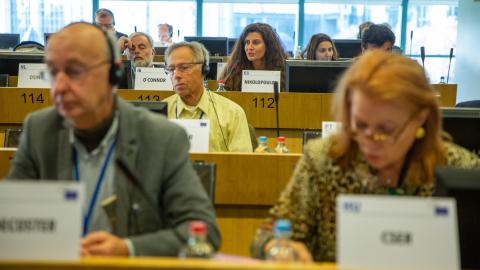European Economic
and Social Committee
Climate justice cannot be gender-blind
The European Economic and Social Committee (EESC) held a debate on Gender Equality and Women's and Girls' empowerment in the context of Food Security and Nutrition. In light of the climate crisis, and in the context of the recent COP27, the EESC has identified the intersection between gender and climate change as a top priority for the EU. The debate is an important contribution to the ongoing EESC initiative on gender equality.
Due to COVID-19 and the climate crisis, the number of people with food insecurity is increasing, as are inequalities between men and women. Women from local and indigenous communities are the most negatively impacted by climate change, both in their livelihood and through the increase of violence in communities affected.
Lauren Phillips, Deputy Director of the FAO's Division for Inclusive Rural Transformation and Gender Equality, stressed that The change in social norms is a slow one, and it involves working actively on the ground within communities and within households. Policies that engage social norms should include the entire community in the process; it is not up to women alone to change social norms.
Phillips went on to illustrate the FAO's four objectives for achieving gender equality: increasing women's voices in decision-making, access to natural productive resources, access to decent work and elimination of the gender pay gap, reducing the burden of the work that women face by promoting an equal distribution of responsibilities in the household.
Sascha Gabizon, from Women Engage for a Common Future, presented how the gender perspective was involved at COP27. Women Engage for a Common Future brought 100 women from Africa, Asia and Latin America to Egypt to talk with decision-makers, together with the three winners of their Gender Just Climate Solutions Awards, granted every year to grassroots initiatives and organisations tackling the climate crisis while promoting gender equality.
There is a clear link between violence and climate change in the fight for scarce resources where women need to defend their livelihood. In the negotiations, we need to make sure to protect the most vulnerable in all their diversities,
said Gabizon.
EESC Member and president of the Ad hoc Group on Equality, Maria Nikolopoulou, explained that the objective of these parallel debates on gender equality is to mainstream the topic in the work of each section. Gender equality is not a women's issue, it has an impact on the entire society
, she concluded.
The debate was the part of a series of events organised by the EESC as a follow-up to the European Parliament's Gender Equality Week initiative. Find the agenda here.
Work organisation
Downloads
-
Climate justice cannot be gender-blind
